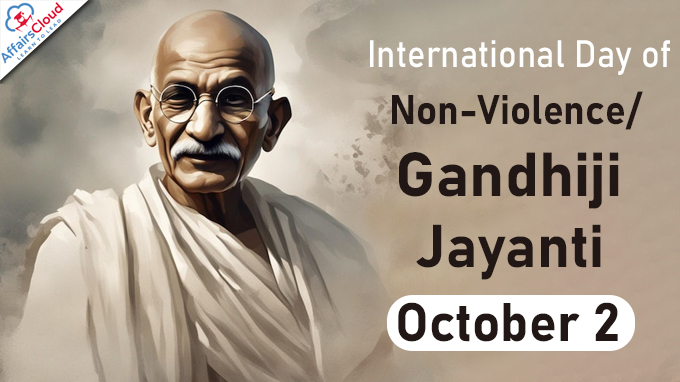 The United Nations (UN)’s International Day of Non-Violence is annually observed across the globe on 2nd October to celebrate the birthday of Mahatma Gandhi, leader of the Indian Independence movement and pioneer of the philosophy and strategy of non-violence.
The United Nations (UN)’s International Day of Non-Violence is annually observed across the globe on 2nd October to celebrate the birthday of Mahatma Gandhi, leader of the Indian Independence movement and pioneer of the philosophy and strategy of non-violence.
- In India, the day is observed as Gandhi Jayanthi.
- 2nd October 2023 is the 154th Birth Anniversary of Mahatma Gandhi and 17th International Day of Non-Violence.
Background:
i.The idea of International Day of Non-Violence was initially proposed by Iranian Noble Laureate Shirin Ebadi in 2004.
ii.In June 2007, the United Nations General Assembly(UNGA) adopted the resolution A/RES/61/271 and declared October 2 as the International Day of Non-Violence.
- The day was first observed on 2nd October 2007.
- The day aims to spread the message of ‘Say No to Violence’ through education and public awareness.
iii.The resolution reaffirms “the universal relevance of the principle of non-violence” and the desire “to secure a culture of peace, tolerance, understanding and non-violence”.
Mahatma Gandhi & Non-Violence:
i.Mahatma Gandhi, often referred to as the “Father of the Nation” in India, was a leader who demonstrated the immense power of non-violence.
ii.His philosophy of “Satyagraha,” which translates to “truth force” or “soul force,” was at the core of his approach to social and political activism.
iii.He believed that Indians must not use violence or hatred in their fight for freedom from colonialism.
Key Principles of Non-Violence
i.Non-violence rejects the use of physical violence in order to achieve social or political change.
ii.Non-Violence is described as “the politics of ordinary people”.
this form of social struggle has been adopted by mass populations all over the world in campaigns for social justice.
iii.Non-violence is a potent weapon for the oppressed. It involves the courage to endure suffering and injustice without resorting to violence in return.
iv.Three main categories of non-violence action are
- Protest and persuasion – Peaceful marches, rallies, hunger strikes, petitions, and boycotts
- Non-cooperation – Tax resistance and civil disobedience
- Non-violent intervention – Blockades and Occupations
Achievements Through Non-Violence
i.Mahatma Gandhi’s non-violent campaigns played a pivotal role in India’s struggle for independence from British colonial rule.
ii.Nelson Mandela and other anti-apartheid activists advocated non-violence, ultimately leading to the dismantling of the apartheid system.
Recent Related News:
The United Nations (UN)’s International Day Commemorating the Victims of Acts of Violence Based on Religion or Belief is annually observed across the globe on 22nd August to condemn the violence and acts of terrorism against individuals of religious minorities, on the basis of or in the name of religion or belief.
About the United Nations (UN):
Secretary-General- António Guterres
Headquarters- New York, United States of America(USA).
Establishment- 1945




